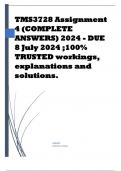TMS3728 Assignment
4 (COMPLETE
ANSWERS) 2024 - DUE
8 July 2024 ;100%
TRUSTED workings,
explanations and
solutions.
ADMIN
[COMPANY NAME]
,Question 1 1.1 Explain why anyone should learn science and why
science should be taught to learners? (4) 1.2 Describe any five (5)
aspects that should be addressed when a science teacher is
developed? (10) 1.3 A teacher might say, “I don’t have time to find
out more about learners’ pre-teaching ideas. What is the point?”
What would you say to this? Do you think there could ever be
advantages to not knowing about learners’ prior ideas? Discuss. (5)
[19]
Certainly! Let's break down each part of the question:
1.1 Why anyone should learn science and why science should be
taught to learners? (4)
Learning science is crucial for several reasons:
• Understanding the natural world: Science helps us
comprehend the world around us, from the smallest atoms to
the vastness of space.
• Critical thinking: It fosters critical thinking skills by
encouraging questioning, experimentation, and analysis of
evidence.
• Problem-solving: Science equips individuals with the ability
to solve complex problems using logical reasoning and
evidence-based approaches.
• Innovation and progress: Many advancements in technology,
medicine, and society stem from scientific discoveries.
• Informed decision-making: Understanding scientific
principles enables informed decisions on personal health,
environmental issues, and societal challenges.
, Teaching science to learners ensures that these benefits are passed
on, preparing them to engage with and contribute to a scientifically
literate society.
1.2 Describe any five (5) aspects that should be addressed when
a science teacher is developed? (10)
Developing an effective science teacher involves addressing the
following aspects:
1. Content knowledge: A deep understanding of the subject
matter being taught.
2. Pedagogical skills: Ability to effectively communicate
complex scientific concepts to learners of varying levels.
3. Classroom management: Skills to create a conducive learning
environment and manage student behavior.
4. Assessment strategies: Techniques to evaluate student
understanding and progress.
5. Integration of technology: Utilizing tools and resources to
enhance learning experiences and access to information.
6. Cultural competence: Understanding and respecting diverse
cultural backgrounds in teaching practices.
7. Professional development: Continual learning and adaptation
to new research and educational methodologies.
8. Ethical considerations: Addressing ethical issues related to
science and promoting responsible scientific conduct.
9. Collaboration: Working with colleagues, parents, and the
community to support student learning.
10. Reflective practice: Engaging in self-assessment and
reflection to improve teaching effectiveness.
These aspects ensure that science teachers are well-prepared to meet
the needs of their students and effectively impart scientific
knowledge.




